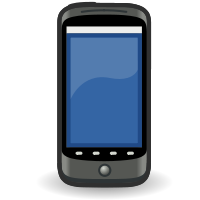I first posed the question, “Could Mobile Health Become Addictive?” on August 20th. Since then I’ve done more thinking and I’m warming to the concept.
I first posed the question, “Could Mobile Health Become Addictive?” on August 20th. Since then I’ve done more thinking and I’m warming to the concept.
To start with, addiction is a word laden with negative meaning. When we hear the word, we think of opiates, street drugs, cigarettes, or possibly gambling. In fact, Wikipedia defines addiction as, “the continued repetition of a behavior despite adverse consequences.” So, with that definition as backdrop, is there any way health can really be addictive? Probably not.
What I’m really talking about is the juxtaposition of motivational health messaging with some other addictive behavior, specifically checking your smartphone.
New evidence shows that people are in love with these devices, checking them more than 100 times per day! I’ve heard people are tapping in 110, even 150 times a day. Of course this varies, but let’s face it, we check our smartphones a lot and it’s hard to stop. A somewhat disturbing video makes the case well. It’s easy to build a case that smartphones are addictive. Recent research shows that checking your phone results in a small release of the neurochemical dopamine. Dopamine release has long been associated with ingestion of addictive substances such as heroin and tobacco. In fact, once the pattern of ingestion and dopamine release is established, even thinking about the ingestion triggers the dopamine release, the biochemical explanation for cravings.
For this post and a series to follow, I choose not to question whether this compulsive relationship with smartphones is good or bad, but simply to acknowledge that it is common, almost universal among smartphone users and to ask if we can exploit it as tool to improve your health.
What makes smartphones so addictive? The evolution of mobile apps has made them the proverbial Swiss army knife of electronic devices. We communicate with them and the need to communicate is a profound human instinct. We can capture and share our lives through the camera and other sensors. We can get instant access to all kinds of important information such as news, weather and maps. They’ve been designed for bite-sized consumption of information. Thus whenever a smartphone user comes upon idle time, say waiting for an elevator or the bus, she will inevitably pull out her smartphone to check on what is new in the last five minutes. The curiosity is too much. Each one of these logins leads to a small reward, and that leads to the small release of dopamine setting up the ‘addiction’ and craving.
Many have talked about the transformational possibilities of mobile health including: the opportunity to use an always on, always connected device to message you in-the-moment about health; to capture health-related information about you via the camera and through connected sensors; and, of course, the ability to display relevant information in context. All of these are exciting, but if we can exploit the addictive quality of smartphones, it will be the most important characteristic of mobile health as we move forward.
So how can we take advantage of this phenomenon to improve your health?
Strategy #1: Make it about life. Patronizing conversations with folks — threatening them with worsening chronic illness if they do not comply — are really old school and largely ineffective. If we can get inside your head and learn what your aspirations are (find a mate, look 10 years younger, get into a swimsuit, etc.) and tie our health-related messaging to those aspirations, we have a better chance of long-term health improvement.
Strategy #2: Make it personal. The more context we know about you, the more we can message you in a very relevant way. The days of public health-related, widespread messaging are going away in favor of personalized medicine. Mobile health must follow.
Strategy #3: Reinforce Social Connections. There are many motivational tools showing up in products on the market these days – incentives, games and coaching to name some — but those with a social component tend to have a greater impact. While not universal, the desire for affiliation runs deep and none of us wants to appear unhealthy to our friends or family. Social networks will be a powerful tool to increase accountability and adherence to care, and wellness plans and mobile phones make social interactions that much more convenient.
So, I’ve given you a glimpse of the strategies, now a sneak peak at the tactics:
Tactic #1: Employ Subliminal Messaging. My favorite example of this phenomenon is the terrifically successful truth campaign from the American Legacy Foundation. They have employed every trendy teen movement you can think of –from texting, to social media to concerts to online voting all in the name of educating teens about how the tobacco industry manipulates their products. It’s a fascinating tact. There is no admonishment about using tobacco per se, only lots of fun ways to bring teens into the conversation about how bad it is for you. Imagine if every time you checked your phone, an unobtrusive brief message appeared on YOUR health issue and how to improve it.
Tactic #2: Use Unpredictable Rewards. B.F. Skinner proved that operant conditioning is more effective when the stimulus and reward are tied only some of the time. The transportation company Uber does this. From time to time, when you open the app you get a surprise (coupon, offer, etc.). That leads people to open the app even when they are not looking for a ride!
Tactic #3: Use the Sentinel Effect. Patients in our connected health programs tell us they are diligent about sticking to the program because their doctor or nurse is watching. This effect of having an authority figure look in on your life is a really powerful tool that can be used to effectively promote good health through mobility.
Is this all nonsense? I don’t think so. Recently Facebook released Facebook Home, an app for android phone users that takes over the phone’s login screen and offers the user access to all of their Facebook updates every time she looks at the phone before turning to whatever she was actually looking for on the phone. What if your health plan or your ACO offered you an app like this, designed to message you about your health, in exchange for a lower premium cost?
Throughout this post I’ve made analogies from the advertising industry. I saw a great quote recently that advertising is moving from the Mad Med generation to the Mr. Spock generation. From billboards and print ads that we all see regardless of relevance (Mad Men style) to personalized, contextual highly segmented messages informed by your last few days of digital behavior (Mr. Spock style). This is where we need to go with health messaging. As we get there, we need to slip these messages in front of you while you’re indulging in that oh, so delicious activity of checking your phone.
I see a lot of potential. What do you think?







-1-250x220.jpg)